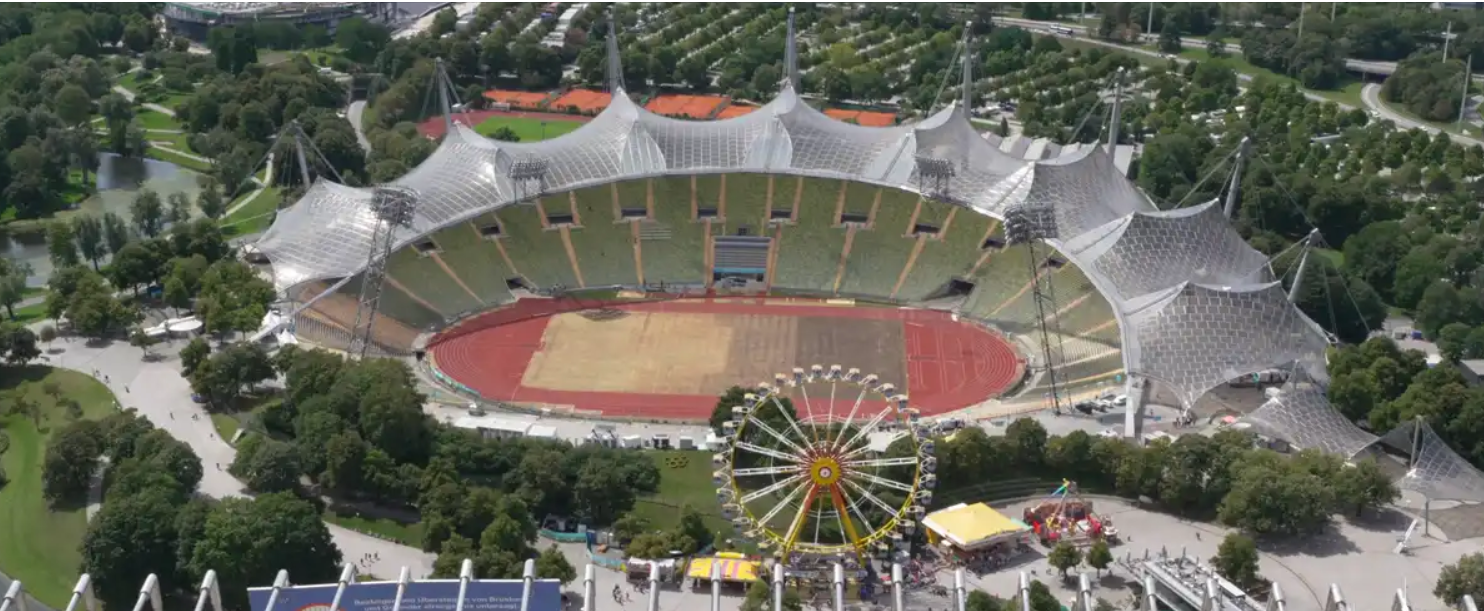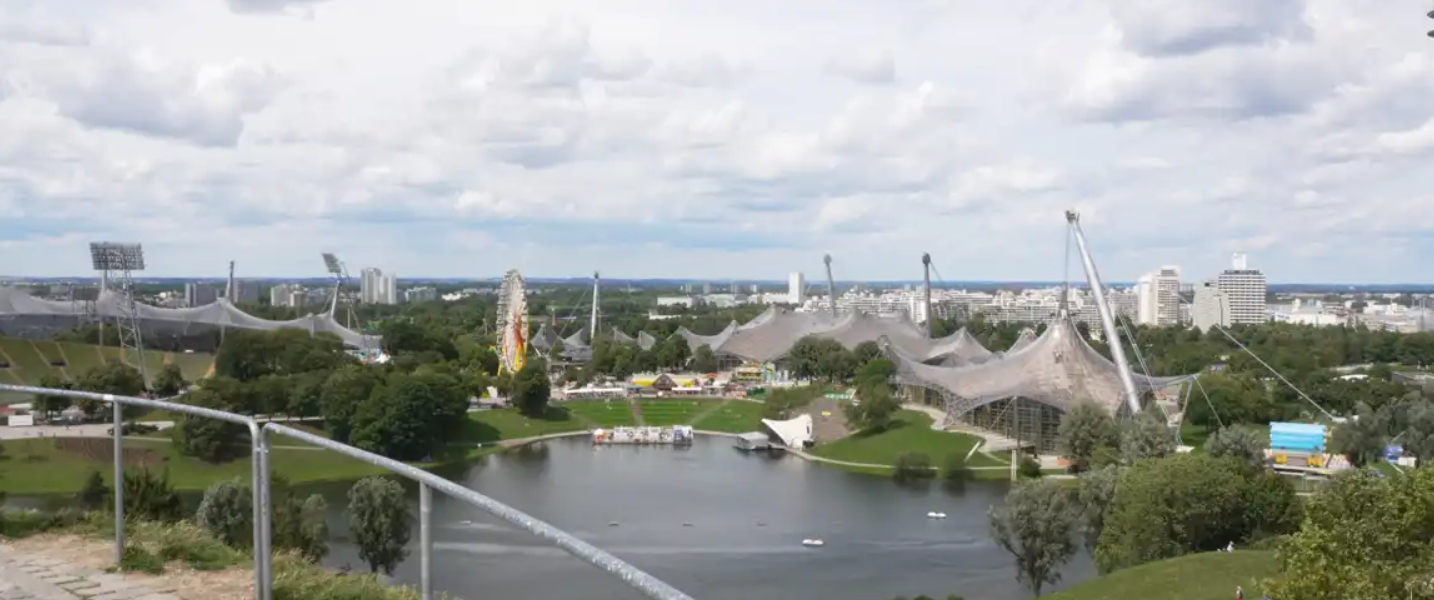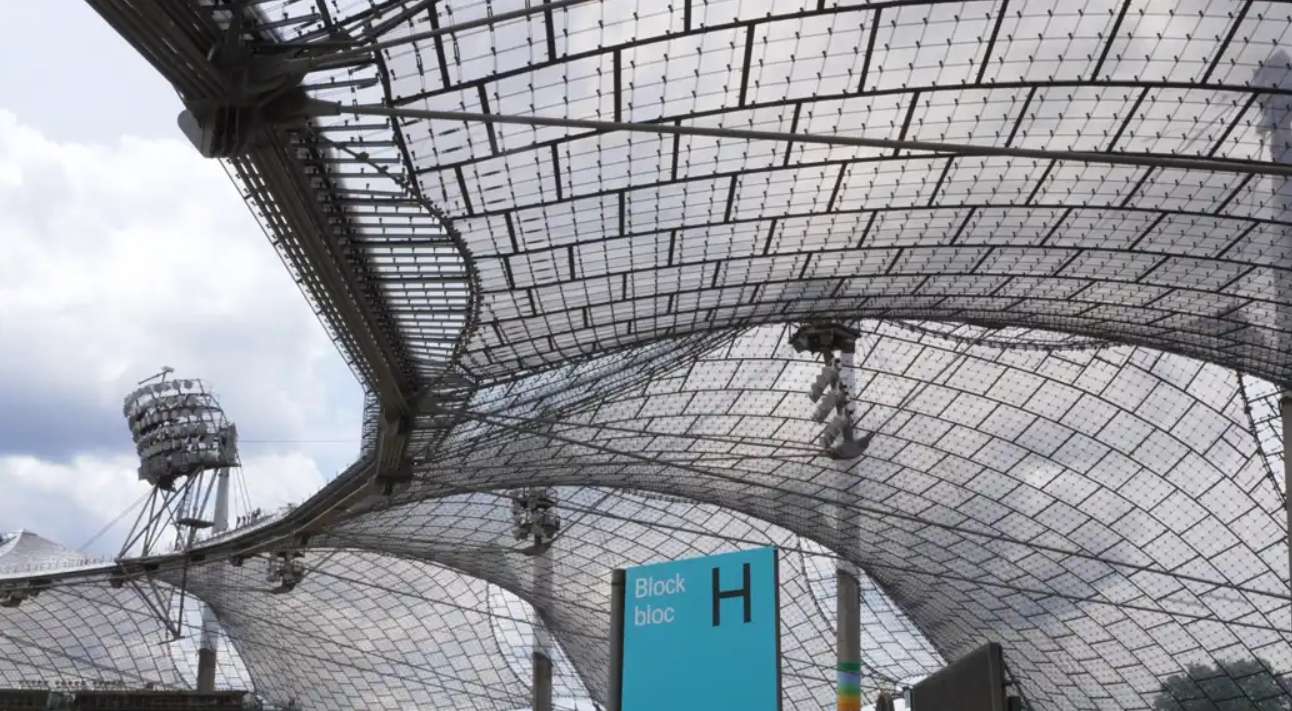Experience sports, history, and spectacular architecture
Address: Olympiapark, Spiridon-Louis-Ring 1, 80809 Munich | Built: 1967 – 1972 | Area: 85 hectares
For sports enthusiasts, architecture lovers, concert fans, recreational athletes, and walkers, the Olympiapark is a perfect place in Munich to pursue their personal passion. The 85-hectare site features hills, a lake, and extensive green space. The freely accessible grounds are ideal for sporting activities such as cycling, jogging, in-line skating, or long walks. The park is also ideal for a leisurely picnic. The impressive buildings with their expressive architecture make the Olympiapark a special attraction. You can see the Olympic Stadium, the Olympic Hall, the Olympic Tower, the Olympic Swimming Hall, and the relatively new SAP Garden. Almost all of them are used for a wide variety of events and sporting activities.
Directions and location of this Munich landmark
The Olympic Park is located in the Munich district of Milbertshofen-Am Hart. This district is located in the north of the city. The park is surrounded by several streets that define the area. To the north is Moosbacher Straße, to the south is Ackermannstraße, to the west is Landshuter Allee, and to the east is Lerchenauer Straße.
The Olympic Park is located approximately 5 kilometers north of the city center and is easily accessible via the Mittlerer Ring. The area surrounding the park has an urban character, offering numerous leisure and recreational opportunities.
Opening Hours and Tours
The Olympic Park is a public park and open to visitors 24 hours a day, year-round. Those wishing to climb the Olympic Tower or visit the Olympic Stadium must adhere to specific opening hours.
Olympic Stadium Opening Hours
Daily from 9:00 a.m. to 6:00 p.m.
Olympic Tower Opening Hours
Monday to Thursday:
10:00 a.m. to 10:00 p.m.
Friday to Sunday:
10:00 a.m. to midnight
Note: The Olympic Tower is expected to be closed until mid-2026 for renovation work!

Munich Olympic Park Admission Prices
Use of the park for sporting activities or picnicking is free of charge, so there is no admission fee. Those wishing to climb the Olympic Tower or visit the Olympic Stadium must pay an admission fee.
Olympic Stadium Admission Prices
Adults:
€3.50 per person
Children:
€2.50 per person
Groups (20 or more people):
€2.50 per person
Olympic Tower Admission Prices
Adults:
€13.00 per person
Reduced:
€10.00 per person
Families:
€29.50 per person
Birthday children and children under 6:
Free
Groups (20 or more people):
€10.00 per person
Guided Tours of the Olympic Park
Since the Olympic Park has a number of sights and attractions to offer, exciting guided tours and varied tours are also offered. There’s a suitable tour for architecture enthusiasts, adventure seekers, and sports fans.
The range of guided tours includes a special stadium tour with plenty of interesting information, insights, and historical background about the Olympic Stadium and FC Bayern Munich.
Those who want to see the Olympic Park from a completely new perspective can do so on a tour across the stadium’s tent roof. Architecture enthusiasts can immerse themselves in the impressive architecture on the architectural tour of the Olympic Park and receive a wealth of information about the planning, construction, and implementation of the gigantic construction project for the 1972 Olympics.
FAQ – Frequently Asked Questions about the Olympic Park
In which district of the Bavarian capital is the Olympic Park located?
The Olympic Park is located in Milbertshofen-Am Hart, about five kilometers from Munich city center. The grounds are easily accessible by car via the Mittlerer Ring. Various public transport options also serve the area.
How large is the Olympic Park?
The Olympic Park, with its lake, hills, green spaces, and impressive buildings, covers an area of 85 hectares.
When were the Olympic Games held in Munich’s Olympic Park?
The 20th Summer Olympic Games were held in Munich’s Olympic Park in 1972.
What happened at the Summer Olympic Games on September 5, 1972?
During this Olympics, there was an attack on the Israeli team headquarters. The Palestinian group “Black September” was responsible for this, taking 11 Israelis hostage and killing a total of 12 people.
Which buildings are located in the Olympic Park?
The Olympic Stadium with its distinctive tent roof is located in the Olympic Park. Another striking building is the Olympic Tower, which rises approximately 291 meters high. The Olympic Hall is used for large-scale show events. The site also houses the Olympic Swimming Hall with a sauna area and various fitness options. A new building has also been built in the Olympic Park. The SAP Garden is a multi-purpose hall used as an ice rink by the Munich DEL ice hockey club Red Bull and the FC Bayern Munich basketball team. Anyone can also ice skate there.
What cultural events take place in the Olympic Park?
Culturally, the Olympic Park offers a fantastic range of events, such as the open-air event “A Midsummer Night’s Dream” with spectacular fireworks. Major figures from the music industry also regularly perform on stage at the Olympic Park. In July/August, there’s the Summer Festival. Another festival is the Tollwood Summer Festival. There, you can admire handicrafts and attend numerous concerts.
Olympic Park – Special Features and Interesting Facts
The Olympic Park, located on the Oberwiesenfeld in the Milbertshofen-Am Hart district, is an 85-hectare park with a truly remarkable sporting past as the host of the 20th Summer Olympic Games. The architectural masterpieces of the buildings constructed there are also groundbreaking, standing out uniquely from the natural landscape. The Olympic Park is also an exceptional place from a cultural perspective.
At the center of the complex is the Olympic Lake, a man-made lake with boat rentals. It is framed by extensive green spaces and hills that are ideal for cycling and walking. A beautiful view of the park and the city can be enjoyed from the Olympic Hill, where rubble from the Second World War was reclaimed. The Olympic Park has become a local recreation area for sporting activities, relaxation, and enjoying nature.
The site is also used for various major events. In addition to sporting events, markets, festivals, and open-air concerts are regularly held there. Coldplay, the Rolling Stones, and Michael Jackson have performed at the Olympic Park. Sports events and concerts also take place in the Olympic Hall. The hall can accommodate up to 15,000 spectators.
The Olympic Stadium in the Olympic Park is now used for events, major gatherings, and open-air concerts. Formerly, between 1972 and 2005, FC Bayern Munich and TSV 1860 Munich trained there. Their home games were also played there.
The Olympic Park is the perfect place for active athletes, offering numerous sporting opportunities. There are climbing walls, bike paths, skateboard lanes, and running tracks, ideal for recreational sports. Part of the grounds is the Olympic Swimming Hall with a competition pool, diving tower, sauna area, and snow cabin.

Historical Facts and History of the Olympic Park
The Olympic Park was built because Munich was chosen to host the 20th Summer Olympic Games in 1972. A park and associated buildings were to be built on the Oberwiesenfeld, which had been used as a commercial airport until 1938.
Most of the area was wasteland and had been used as a rubble dump after the Second World War. When it became clear in 1966 that Munich would be awarded the Olympic Games, the contract for the construction of the Olympic Park was awarded to the architectural firm Behnisch & Partner.
The Olympic Stadium, with its distinctive tent roof, is an architectural masterpiece and renowned worldwide. Designed by architect Frei Otto, the tent roof was constructed from plastic. Transparent material was used to symbolize openness and lightness.
Another structure was built for the 1972 Olympic Games: the Olympic Tower. It rises 291 meters and is one of the most striking structures. Those who ascend to the observation deck are treated to a magnificent view of the city and the mountain landscape beyond.
To accommodate all the sports of the Summer Olympics, an ice rink and an Olympic swimming pool were also built. A 50-meter competition pool and a diving tower were constructed to accommodate Olympic disciplines. The ice rink has since been replaced by a multi-purpose hall, the SAP Garden.
The green spaces between the individual buildings were primarily designed by landscape architects Wolfgang Miller, Günther Grzimek, and Hans Lutz. The Olympic Village, built specifically for the athletes participating in the Olympics, is now home to more than 6,000 Munich residents.

Sights and attractions in the immediate vicinity of the Olympic Park
There are many sights and attractions to discover in the Olympic Park and just as much in the immediate vicinity. In addition to the magnificent buildings, which shine with their groundbreaking architecture, there are also some significant sights that are less immediately noticeable. They all tell their own unique story.
The Olympic Park features a special memorial commemorating the victims of a terrorist attack. In the Olympic Village, the Israeli team was the victim of an attack by the Palestinian group “Black September.” Eleven athletes and a German police officer lost their lives. This attack overshadowed the 20th Summer Olympic Games in Munich.
Another attraction in the Olympic Park is the “Munich Olympic Walk of Stars.” It is 800 meters long and is located at Willi-Daume Platz, on the north side of the Olympic Lake. Famous musicians and show stars such as Bon Jovi, Pink, Sarah Connor, Iron Maiden, Udo Lindenberg, David Copperfield, and football legends such as Thomas Linke, Hansi Pflügler, and Raimond Aumann have immortalized themselves there.
Car enthusiasts will find their money’s worth at the BMW Museum and BMW Welt. They are located in the immediate vicinity of the Olympic Park. There, they can immerse themselves in the history and future of the automakers in a unique way. The BMW Welt building, with its futuristic architecture, is a remarkable eye-catcher.
In the immediate vicinity of the Olympic Park is the Borstei, a distinctive, historic residential complex. Between the buildings, there are pretty little parks and a rose garden that invite you to linger and relax. From Löfftzerstraße, you’ll find the Borstei Museum, Munich’s smallest museum. It exhibits local treasures and rarities typical of Munich.
Cafés and Restaurants Near the Olympic Park
There are numerous restaurants and cafés near the Olympic Park in Munich. They feature a variety of styles and serve delicious delicacies from a variety of cuisines. Guests can choose between tasty, hearty dishes or culinary delights. There’s a restaurant to suit every taste.
The Olympia Alm Beer Garden not only boasts a great view of the Olympic Park and the city, but also offers good food at reasonable prices. Located at the highest beer garden in Munich, the menu mainly features hearty dishes such as ribs or pork knuckle. You can also find delicious salads with a special touch. In nice weather, you can sit comfortably outside under the large parasols. During the winter months, the indoor area offers ample space.
Address: Olympia Alm, Martin-Luther-King-Weg 8, 80809 Munich
The Bavaria by Käfer is located directly next to the Olympic Park in the BMW Welt building. The kitchen serves Bavarian and international dishes, focusing on fresh, locally sourced and sustainable ingredients. The restaurant boasts a modern, sophisticated, yet relaxed atmosphere, skillfully blending international influences with Bavarian tradition.
Address: Bavarie by Käfer, Brasserie in BMW Welt, Olympiapark 1, 80809 Munich
Poseidon on Leonrodstraße is not far from the Olympic Park. Authentic Greek and Mediterranean dishes are prepared in the kitchen. The menu includes calamari, lamb, and other delicacies. The portions are generous, ensuring everyone will be satisfied. The cozy dining room invites you to linger and enjoy. The outdoor area is also open when the weather is nice.
Address: Poseidon, Leonrodstraße 85, 80636 Munich
The Augustiner Bräustuben on Landsberger Straße is the perfect restaurant for lovers of hearty cuisine. This traditional Bavarian inn serves Bavarian dishes such as Wiener Schnitzel, pork knuckle, white sausage, and dumplings. Augustiner beer is freshly tapped from the barrel. Guests at the Augustiner Bräustuben experience the typical Munich flair in a lively, rustic atmosphere.
Address: Augustiner Bräustuben, Landsberger Straße 19, 80339 Munich